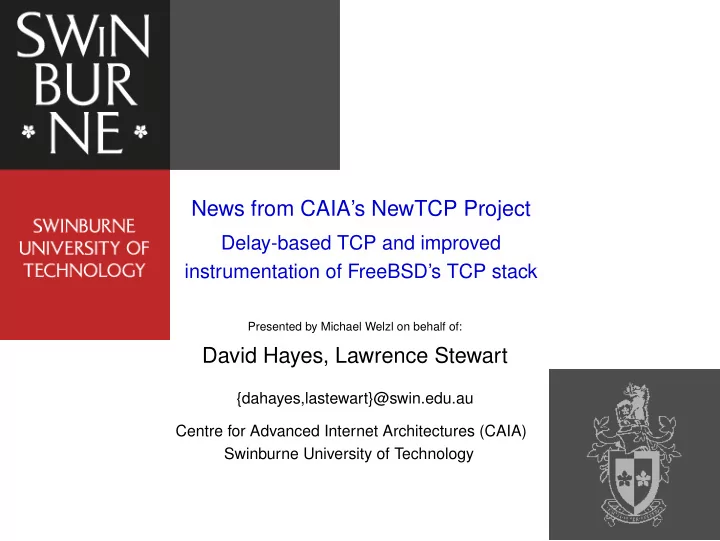

News from CAIA’s NewTCP Project Delay-based TCP and improved instrumentation of FreeBSD’s TCP stack Presented by Michael Welzl on behalf of: David Hayes, Lawrence Stewart {dahayes,lastewart}@swin.edu.au Centre for Advanced Internet Architectures (CAIA) Swinburne University of Technology
FreeBSD As A Research Platform Modular congestion control In svn project branch, coming to a FreeBSD release soon Available as a stand alone patch on the NewTCP website BSD licenced NewReno, HTCP , CUBIC, Vegas, HD & CHD implementations available New v0.10.0 release contains many improvements and paves way for shared CC between multiple transports e.g. TCP and SCTP Supported by Cisco Systems KHELP and Enhanced RTT Kernel Helper (KHELP) framework makes modularising “stuff” easy Enhanced RTT (ERTT) KHELP module hooks TCP stack to maintain an RTT estimate appropriate for CC use Used by Vegas, HD and CHD CC modules ERTT supported by Cisco Systems IETF 78 ICCRG http://www.caia.swin.edu.au {dahayes,lastewart}@swin.edu.au 2
FreeBSD As A Research Platform Statistical Information for TCP Research (SIFTR) FreeBSD kernel module to gather TCP connection data as CSV Some similarity to Web100 but event driven and more variables v1.2.3 has been integrated into FreeBSD and will appear in 8.2+ Supported by Cisco Systems and the FreeBSD Foundation Deterministic Packet Discard (DPD) Adds ’pls’ (packet loss set) option for dummynet pipes e.g. ipfw pipe 1 config pls 1,5-10,30 would drop packets 1, 5-10 inclusive and 30 Dummynet Forensic logging support Log pipe/queue state on each packet event as CSV TCP stack improvements including RFC 3465 & reassembly queue autotuning Supported by the FreeBSD Foundation IETF 78 ICCRG http://www.caia.swin.edu.au {dahayes,lastewart}@swin.edu.au 3
Delay-based Congestion Control Implementation of the algorithm proposed by Budzisz et al. [1] (we call it HD) Probabilistic backoff based on inferred path queueing delay Per−packet backoff backoff probability g ( q ) probability p max A B Queuing q max q min q th delay Figure: Per-packet backoff probability as a function of estimated queueing delay[1] IETF 78 ICCRG http://www.caia.swin.edu.au {dahayes,lastewart}@swin.edu.au 4
Delay-based Congestion Control continued “CHD”: Enhanced HD (Hayes and Armitage [2]) Per RTT backoff decisions (for scalability and fairness) Tolerance of non-congestion related packet loss Improved coexistence with loss based algorithms in lightly multiplexed environments. Figure: Interaction of the shadow window ( s ) and the congestion window ( w ) when competing with loss based CC flows. lost packet s sync � 4 packets s lost � 2 transmission � 5 gained opportunity transmission opportunity w � 3 � 1 w recovery delay based congestion without w recovery s = 0 number of round trip times IETF 78 ICCRG http://www.caia.swin.edu.au {dahayes,lastewart}@swin.edu.au 5
6 10 x 10 NewReno HD CHD 8 1/sqrt(p) Goodput (bps) 6 4 2 0 0 0.01 0.02 0.03 0.04 0.05 Probability of non−congestion related loss Figure: Comparison of the goodput of NewReno, HD, and CHD when there are non-congestion related losses (10 Mbps bottleneck, 40 ms baseRTT, 100 ms queue at the bottleneck) IETF 78 ICCRG http://www.caia.swin.edu.au {dahayes,lastewart}@swin.edu.au 6
Delay-based Congestion Control continued Issues with inferred queueing delay CC signals: Unfairness when BaseRTT estimate is wrong Setting queueing delay thresholds (depends on network path) We have been revisiting the idea of delay gradient as a congestion signal (CDG – Hayes and Armitage [3]). Why? Does not require an accurate estimate of baseRTT Thresholds are less dependent on network path Hybrid Combining the strengths of a threshold system based on inferred queueing delay, with the strengths of a delay-gradient approach may provide a more robust mechanism. IETF 78 ICCRG http://www.caia.swin.edu.au {dahayes,lastewart}@swin.edu.au 7
Further Information Contact David Hayes <dahayes@swin.edu.au> Lawrence Stewart <lastewart@swin.edu.au> Grenville Armitage <garmitage@swin.edu.au> Links http://caia.swin.edu.au/urp/newtcp/ http://caia.swin.edu.au/freebsd/etcp09/ IETF 78 ICCRG http://www.caia.swin.edu.au {dahayes,lastewart}@swin.edu.au 8
Acknowledgements Cisco Systems The FreeBSD Foundation IETF 78 ICCRG http://www.caia.swin.edu.au {dahayes,lastewart}@swin.edu.au 9
References [1] L. Budzisz, R. Stanojevic, R. Shorten, and F Baker. A strategy for fair coexistence of loss and delay-based congestion control algorithms. IEEE Commun. Lett. , 13(7):555–557, July 2009. [2] David A. Hayes and Grenville Armitage. Improved coexistence and loss tolerance for delay based TCP congestion control. In 35th Annual IEEE Conference on Local Computer Networks (LCN 2010) , Denver, Colorado, USA, October 2010. (to be presented). [3] David A. Hayes and Grenville Armitage. Revisiting TCP congestion control using delay gradients. 2010. (submitted to ACM CoNEXT). IETF 78 ICCRG http://www.caia.swin.edu.au {dahayes,lastewart}@swin.edu.au 10
Recommend
More recommend